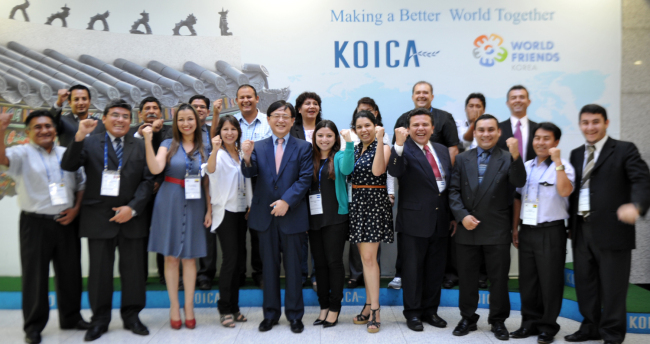Twenty top policymakers from 10 developing countries gathered Monday to explore ways to improve their rural revamp and regional development strategies based on Korea’s experience.
The Korea International Cooperation Agency, in charge of the country’s grant aid, is hosting the weeklong training session to share its know-how from the Saemaul Movement, an agricultural and community reform campaign in the 1970-80s.
 |
| Korea International Cooperation Agency President Kim Young-mok (fifth from left, front row) poses with high-level government officials from developing nations taking part in the Saemaul Movement program at the KOICA office in Seongnam, Gyeonggi Province, Monday. (Yonhap) |
The officials are of director-general or higher levels and from such countries as Vietnam, Myanmar, Laos, Senegal, Ethiopia and Uganda. They include Nguyen Tat Giap, deputy director of the Ho Chi Minh National Academy and Public Administration; Phet Phomphiphak, Laos’ vice minister of agriculture and forestry; and Dogo Seck, general secretary of Senegal’s Ministry of Agriculture and Rural Equipment.
During their stay, the participants are scheduled to study and debate about the Saemaul Movement and similar practices adopted in Rwanda and elsewhere, while touring major agro-fishery marketplaces, horticultural institutes and farms.
They will also take part in the Global Saemaul Forum, which will kick off Wednesday in Gyeongju, North Gyeongsang Province, to discuss international partnerships to combat poverty for three days.
“The Saemaul Movement contributed to curbing inequality, improving health care and education and securing energy resources, bringing the government and the people together,” KOICA president Kim Young-mok said in a statement.
“I hope this program will provide a chance for the movement to help enhance the people’s livelihoods in developing nations and develop further into a model for sustainable development.”
By Shin Hyon-hee (heeshin@heraldcorp.com)



